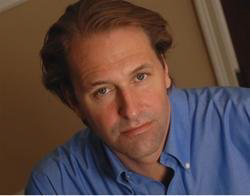Ruhlman on paying attention
October 21, 2014 by Jane Award-winning author Michael Ruhlman is back
with another cookbook, How to Roast. (You can enter our contest for your chance to win a copy
of the book.) It’s the first in a series of “how-to” books he plans
to publish, and he’s hinted that the next book will be about
braising. Ruhlman provided EYB with an excerpt from the
introduction of How to Roast to share with our members. It
is presented without further ado:
Award-winning author Michael Ruhlman is back
with another cookbook, How to Roast. (You can enter our contest for your chance to win a copy
of the book.) It’s the first in a series of “how-to” books he plans
to publish, and he’s hinted that the next book will be about
braising. Ruhlman provided EYB with an excerpt from the
introduction of How to Roast to share with our members. It
is presented without further ado:
When you set your oven to 350˚F, do you believe that it is an absolute and uniform measurement of temperature? Or 180˚C, for that matter?…
Happily we don’t need to know the precise, +/− 0.1-degree measurement when we’re roasting a leg of lamb or some parsnips. Foods that we roast are generous and easygoing. Temperature and time are more critical for baked goods. Leave a second batch of cookies in for five extra minutes and you’ve got two different cookies (one may be ruined); do that with a roasted chicken and the difference is not likely to be noticeable. This also reflects the fact that the smaller the food item is, the smaller the window you have in terms of pulling it out of the oven at its moment of perfection.
More important than choosing 350˚F/180˚C rather than 375˚F/190˚C is paying attention to the food itself.
What this means cannot be overemphasized. If I am washing salad greens, with my back to the oven, I am still paying attention to that standing rib roast in the oven. If I’m washing greens, it means that dinner is nearly ready and the meat has been roasting for most of my intended cooking time, so if I don’t smell deliciousness in the kitchen, my oven is not hot enough. If I smell smoke, I need to pay even more attention and maybe turn around and use my eyes. If my rib roast has been in the oven for only 15 minutes and I hear violent crackling, I’d better check to make sure that the oven is not too hot. I certainly wouldn’t pay attention to the recipe in the book I was following because that won’t tell me anything about what my roast is doing in my oven at that moment.
So when you’re cooking, you’re using all your senses, the most important of which is common sense. And that just means paying attention. If you smell burning and your roast shouldn’t be close to done, you need to evaluate. And you should not simply pay attention to today’s chicken or pan of root vegetables and then hit the “reset” button in your brain. You should have roasted chicken and root vegetable files in the vault of your cooking experience…This is how, over time, you develop cooking sense. Cooking sense comes from being aware; to be aware we use taste, touch, smell, sound, sight, experience, and common sense over the continuum of our cooking lives. We might never be able to achieve a state of absolute awareness in the kitchen, but if we strive to pay attention, we continually turn up that awareness by degrees each time we apply heat to food.
Now, having addressed your most valuable cooking tool, well protected between your ears, I return to the primary roasting tool, the oven…generally speaking, “Know thy oven” means paying attention to how it has behaved in the past, knowing where the hot spots are, understanding how your particular convection fan works, and so on. Implicit in the command is not to be overly dependent on a recipe. Common sense should almost always override a recipe instruction.
Excerpted from RUHLMAN’S HOW TO ROAST. Copyright 2014 by Michael Ruhlman. All rights reserved. No part of this excerpt may be reproduced or printed without permission in writing from the publisher. Reprinted by arrangement with Little, Brown and Company.
Categories
- All Posts (6940)
- Antipasto (2135)
- Author Articles (247)
- Book News (935)
- Cookbook Giveaways (983)
- Cookbook Lovers (257)
- Cooking Tips (109)
- Culinary News (299)
- Food Biz People (552)
- Food Online (791)
- Holidays & Celebrations (272)
- New Cookbooks (149)
- Recipes (1500)
- Shelf Life With Susie (231)
- What's New on EYB (133)
Archives
Latest Comments
- Atroyer7 on Danube Cookbook Review and Giveaway
- demomcook on What foods do you look forward to the most for each season?
- demomcook on Danube Cookbook Review and Giveaway
- Darcie on How cookbooks can help build resilience
- mholson3 on Danube Cookbook Review and Giveaway
- Rinshin on How cookbooks can help build resilience
- sarahawker on Danube Cookbook Review and Giveaway
- Sand9 on Danube Cookbook Review and Giveaway
- hankintoby29 on Heritage Cookies of the Mediterranean World – Cookbook Giveaway
- WBB613 on Feasts of Good Fortune Cookbook Giveaway